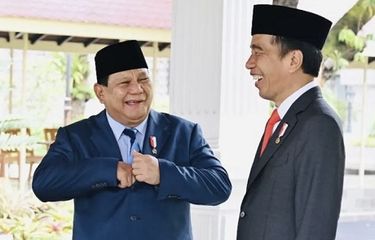The Digitalization Program of the Prabowo-Gibran Government for the Improvement of Public Services
By: Anggara Putra*)
In an increasingly advanced digital era, the government of Prabowo Subianto-Gibran Rakabuming Raka has positioned digitalization as its flagship program in an effort to enhance public services. Various strategic policies have been designed to integrate technology into the government structure, aiming to create services that are more efficient, transparent, and have a direct impact on the welfare of the community.
The digitization of this infrastructure is also expected to support strategic economic sectors, such as renewable energy and the creative industry. The government aims to target digitalization as the main catalyst in enhancing the nation’s competitiveness on a global scale, as well as opening up more investment opportunities.
In addition to structural reforms, the Vice Chairman of the Economic Team of the elected President Prabowo-Gibran, Prof. Laode Kamaluddin, emphasized that digitalization will be a core policy in this new government program. Prof. Laode stated that the digitalization program initiated by the previous government is considered to provide many benefits, particularly in cost efficiency and the improvement of public service quality. According to Prof. Laode, the program that has been conceived and implemented by the government is seen as highly beneficial, including being well-documented and organized, and capable of saving about 30 percent of the budget. This statement indicates that by using digital technology, administrative processes and public services can be carried out more quickly, efficiently, and with minimal errors. Documents that previously had to be managed manually can now be stored and accessed through a secure and integrated digital system.
In addition to the public service and infrastructure sectors, digitization is also expected to be applied in the sustainable management of natural resources. This was expressed by the Rector of Pancasila University, Prof. Marsudi Wahyu Kisworo, who urged the Prabowo-Gibran administration to seriously consider the implementation of digital technology in managing natural resources. Prof. Marsudi explained that the digitalization of sustainable natural resources involves the use of digital technology to manage, monitor, and optimize the use of natural resources to make it more efficient, environmentally friendly, and sustainable. With this technology, the government can ensure that the use of natural resources, such as energy, water, and land, is carried out optimally and does not harm the environment.
Digitalization in the management of natural resources also allows for more transparent and accurate monitoring. The government can track and manage resource reserves in real-time, ensuring that the resources being exploited do not exceed the capacity that nature can renew. Thus, the management of natural resources can be more sustainable, while also ensuring that future generations can continue to enjoy Indonesia’s natural wealth.
The digitalization program implemented by the Prabowo-Gibran administration not only focuses on efficiency and transparency in the public sector but also has a significant impact on national economic growth. The integration of technology in various sectors, including public services, infrastructure, and natural resources, will create new jobs in the information technology and digital industries.
In addition, with effective digitalization, the government can empower Micro, Small, and Medium Enterprises (MSMEs) to be more competitive in the global market. Access to technology and broader markets through digital platforms will provide opportunities for MSMEs to grow rapidly, enhance their competitiveness, and contribute to the country’s economy.
On the other hand, the community will also directly benefit from this digitalization program, such as the ease of accessing health services, education, and population administration online. With public services that are faster, more accurate, and easily accessible, the community can save time and costs in managing various administrative needs.
Nevertheless, this digitization program certainly does not come without challenges. One of the biggest challenges is the inadequate technology infrastructure in remote areas. The government must ensure that the digitalization program reaches even the remote areas of the country, so as not to create a digital divide between urban and rural regions.
In addition, the digital literacy of the community is also an important issue that must be addressed. The government needs to provide education and training to the community so that they can make wise and optimal use of digital technology. In this regard, the participation of the private sector, academia, and the wider community is essential for the success of this program.
On a different occasion, the Rector of Pancasila University (UP), Prof. Dr. Ir. Marsudi Wahyu Kisworo IPU, also expressed the opinion that the free nutritious meal program proposed by Prabowo-Gibran needs to implement digital transformation to enhance efficiency and optimization in its execution. According to him, if digitalization is applied to the free nutritious meal program, its implementation will be more efficient and optimal.
Furthermore, Prof. Marsudi stated that the digitalization of sustainable natural resources is the use of digital technology to manage, monitor, and optimize the use of natural resources to make it more efficient, environmentally friendly, and sustainable.
Professor Marsudi also highlighted Indonesia’s position as a middle-income country that often gets trapped in that class, making it difficult to transform into a developed nation. However, digital transformation can be one of Indonesia’s main assets to escape that trap while also providing a multiplier effect in pushing Indonesia towards becoming a developed country and achieving the vision of Golden Indonesia 2045. Thus, the program proposed by Prabowo – Gibran is considered appropriate and worthy of full support.
Overall, the digitalization program of the Prabowo-Gibran administration has the potential to lead Indonesia into a new era that is more advanced and globally competitive. With the appropriate application of technology, it is hoped that public services can become better, more efficient, and inclusive, thereby providing real benefits for all the people of Indonesia.
*) Public policy observer
